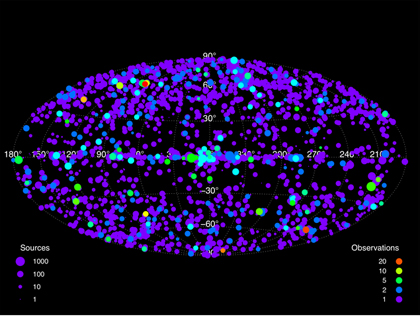Women in the High-Energy Universe: Janet DePonte Evans
Janet DePonte Evans is the Software Development Manager for the Chandra X-ray Center Data System (CXCDS) group, which provides end-to-end scientific software for Chandra's mission operations. This includes software to manage the scientific proposals, mission planning software prior to an observation, and then the software to reduce and analyze the scientific data returned from the telescope. Janet's group also developed and maintains the Chandra data archive and interfaces that allow scientists to retrieve Chandra data for further study.

My interest in science started in middle school. I participated in science fairs and then took advanced science courses in high school. I majored in biology in college with a minor in computer science. My interest in astronomy came when looking for a career that combined software development, science and math.
My biggest opportunity came in college where computer science was a new degree with plenty of room for students outside of the major to take courses. I really excelled in the software courses where the basis of knowledge was applying a small set of rules to solve a large range of problems. I believe hard work and dedication, which I was taught from my family, has helped me over the years to work through challenges and grow in my career. I also have endeavored to pick up the best practices of managers and colleagues that I've worked with over the years and turn them into my own. One particular colleague at the Harvard-Smithsonian Center for Astrophysics (CfA) took an interest in me and mentored me during my first few years. Along with teaching good programming practices, I remember she taught me when you should stay and work through a problem on your own -- and when you should get some help. I think mentoring is important to a new career.
My job has evolved over the years. Now, I manage the software development team efforts on behalf of the project. I coordinate the development priorities, manage the schedule and coordinate the release of CXCDS software. My group includes a talented team of software developers that build and maintain the Chandra software in coordination with the science team.
I enjoyed programming in the early days of my career and being part of a team working on software to reduce and analyze X-ray telescope data. My position evolved to a project lead and then software development manager. I enjoy management because it gives me the ability to have a larger positive impact on the project. I also enjoy using my organizational skills and knowledge base in software and data processing to coordinate with scientists and guide my team in building and maintaining robust software systems.
My advice for someone interested in a career similar to mine is that the science/software field is an exciting career choice for its challenges and changing technology environment. No one day or one year is a repeat of a previous experience. Management within the field is something that most developers get to try out in their career. Some prefer staying very technical and specialized with software development where others like myself enjoy the challenges associated with stepping back and interacting with the project and team on a larger scale. I think it's worth giving both a try and settling in on what feels right.

As I mentioned before, working in the field of science and engineering is a rewarding career choice. I'm always proud to explain to people I meet about where I work and what we do. They are always fascinated about what goes on at CfA and the advances in our understanding of the Universe that come from the studies that go on here. For my part, I enjoy contributing to that knowledge through the software systems that we provide and encourage any young person seeking a challenging and rewarding career to give astronomy and software engineering a hard look.
-Janet DePonte Evans
Category:
Subcategory:
- Log in to post comments
